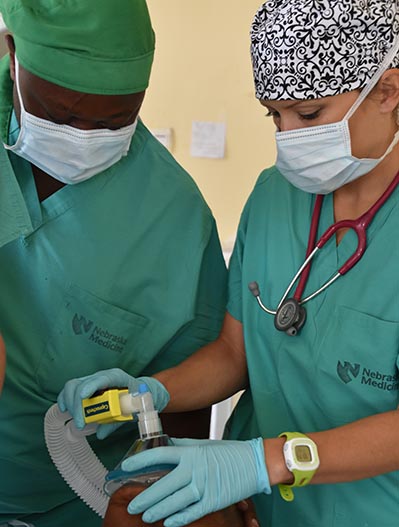UNMC researchers are part of an international team that demonstrated how sepsis infections can be recognized before they become lethal in resource-limited environments.
The international team is known as the Sepsis Assessment and Identification in Low Resource Settings (SAILORS).
 |
Jamie Kobs, right, teaching a medical student in Gitwe. |
“Intensive medical management can be lifesaving if patients with sepsis are identified early enough,” Dr. Patterson said. “Unfortunately, predicting which patients with infection will develop sepsis is difficult, particularly in resource-limited environments where laboratory data and sophisticated monitoring are not available.”
Dr. Patterson cited the quick Sequential Organ Failure Assessment (qSOFA) as a simple tool which allows clinicians to use three bedside assessments to predict whether a patient is developing sepsis: mental status, respiratory rate, and blood pressure.
In the May issue of the Journal of the American Medical Association (JAMA), Dr. Patterson and his UNMC colleagues and members of the SAILORS team, provide evidence that qSOFA is effective in resource-limited environments to ascertain whether a person has sepsis compared to the traditionally used systemic inflammatory response syndrome (SIRS).
“This work represents a collaboration between researchers from around the world,” said Dr. Patterson who’s worked in the rural village of Gitwe, Rwanda, for more than a decade. “For the SAILORS study, we worked with investigators from Bangladesh, Haiti, India, Indonesia, Sri Lanka, Thailand, Vietnam, Sierra Leone, Rwanda and Myanmar.”
Dr. Patterson said the SAILORS project highlights the remarkable work of health professionals including Urayeneza Olivier, M.D., and Urayeneza Gerard in Gitwe, as well as numerous others in Africa and Asia who dedicate their lives to the care of others in resource-limited environments.
He said UNMC’s earlier study in Gitwe was among the largest included in the SAILORS analysis. The UNMC team, together with individuals from Rwanda and Austria, conducted the yearlong study of sepsis in Gitwe that included more than 1,500 patients.
“We are grateful for the opportunity to learn from them and with them,” he said. “And, we are indebted to the patients who participated in the SAILORS studies. They provided the information that made this work possible.”
UNMC and Nebraska Medicine health professionals and medical students participate in education, research and clinical care in Gitwe.
